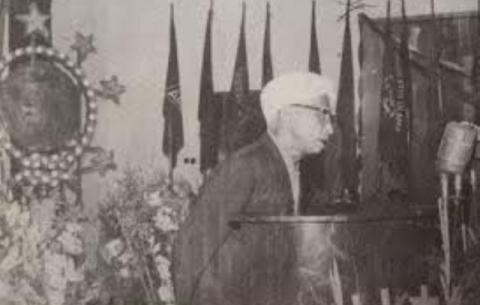Halal bi Halal initiated by KH Wahab Chasbullah amidst political tension
NU Online · Kamis, 6 Juni 2019 | 05:42 WIB
Differences in orientation and political views have often created tension between political elites. In fact, politics is inseparable from those giving their support for certain parties. In turn, the tension arises not only in the elite, but also in the grassroots level.
Tensions and conflicts involving political elites have polarized people's lives especially in every political event. For example in 1948, At that time, the Indonesian nation was also in the threat of disintegration caused by the actions of several groups launching rebellion, the so-called bughot.
Due to such political condition, KH Abdul Wahab Chasbullah (1888-1971) initiated an activity popularly known as halal bi halal name for all national leaders at the request of President Soekarno at that time.
From the history told by the NU senior figure KH Masdar Farid Mas'udi, in 1948 in the middle of Ramadan, Soekarno called KH Wahab Chasbullah to the State Palace to meet him in consulting and asking for advises in hopes of overcoming the unhealthy Indonesian political situation at the time.
Then Kiai Wahab gave advice to Soekarno to organize a gathering. Because the Idul Fitri would come soon, in which all Muslims are supposed to hold meetings to apologize to one another. Then Soekarno replied, "greetings are normal, I want another term".
"It is easy," said Kiai Wahab. "Well, the political elites do not want to unite, because they blame each other. Blaming each other is sin. Sin is forbidden. In order that they do not have sin (haram), it must be made lawful. They have to sit in a meeting to forgive each other, justify each other. So that we will use the term halal bi halal," explained Kiai Wahab.
On account of the Kiai Wahab's suggestion, then Soekarno during the Idul Fitri invited all political figures to come to the State Palace to attend the gathering which was given the name halal bi halal. Eventually they could sit in one table, as a new chapter to compile the strength and unity of the nation. Since then the term halal bi halal initiated by Kiai Wahab has closely been related to the traditions of the Indonesian nation until now.
That was the deep attention of Kiai Wahab Chasbullah to unite all the national components that were at that time in a political conflict and had the potential to divide the unity. Even philosophically, Kiai Wahab came up with the right term to replace the term silaturahim which according to Soekarno sounded normal so that it would likely be responded to as usual by the leaders in conflict.
Now, the halal bi halal practiced by Indonesian Muslims is more than just interpreting silaturahim. The Kiai Wahab's main purpose is to unite national leaders who are in conflict in addition to demanding individuals who have the wrong and sin to apologize to people who have been hurt with a sincere heart.
Even people who are apologized to give forgiveness so that forgiving each other could realize the Idul Fitri itself, which is to return to the holy soul without stains on the heart.
Experts have not found in the Qur'an or Hadith an explanation of halal bihalal. The term is indeed Indonesian, which was born from the Kiai Wahab Chasbullah's profound and spiritual spontaneity. It may not be well understood for among non-Indonesians, although perhaps they have understood Arabic.
Why? Because the term also emerged historically and philosophically from Kiai Wahab to unite the Indonesian people who were hit by conflict so that they must present an attractive new package so that they would gather and come together in apologizing to each other.
Related to the meaning contained in the term halal bihalal, the prominent Quranic Interpreter Muhammad Quraish Shihab in the so-called Membumikan Al-Qur'an: Fungsi dan Peran Wahyu dalam Kehidupan Masyarakat (1999) explains a number of aspects to understand the term initiated by Kiai Wahab Chasbullah. (Fathoni/Masdar)
Terpopuler
1
Rais Aam PBNU dan Sejumlah Kiai Terima Penghargaan dari Presiden Prabowo
2
DPR Ketok Palu, BP Haji Kini Sah Jadi Kementerian
3
Penerapan Sumpah dan Bukti di Pengadilan Islam: Studi Qasamah dalam Kasus Pembunuhan
4
Wajib Selektif! Ini Tips Islam Memilih Calon Pasangan Hidup yang Tepat dan Berkah
5
DPR-Pemerintah Sepakati RUU Haji dan Umrah Dibawa ke Paripurna untuk Disahkan
6
Gus Faiz Sampaikan Cara Rayakan Bulan Lahir Nabi Muhammad
Terkini
Lihat Semua















